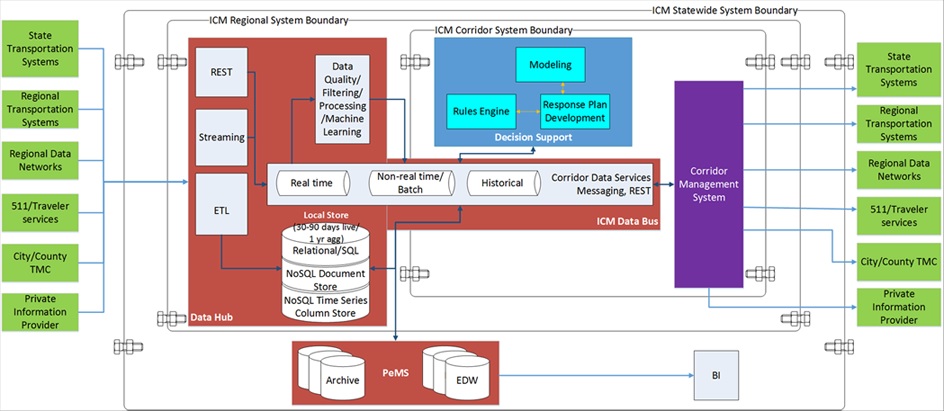Integrated Corridor Management (ICM) is an ITS strategy to manage the capacity of a corridor utilizing existing and new technologies. ICM involves the close coordination and strategic planning of the multiple agencies and service providers in the study area to manage traffic congestion on highways, arterials, and/or transit routes. ICM often enhances the communication between independent systems and provides alternate solutions to moving persons through an impacted area. Depending on the design for a particular program or facility, ICM can include active monitoring of all modes and facilities within the corridor; ramp metering (traffic responsive, time of day, or adaptive); arterial traffic signal coordination; incident traffic management; coordinated highway, arterial, and transit management; advanced traveler information systems; and other techniques to manage and balance demand in the corridor. The following two ICM projects are currently being implemented in the Los Angeles Region while still others are in the planning and feasibility study stages.
I-210 Connected Corridors
The Connected Corridors Program is a Caltrans-led initiative to increase and manage the capacity of congested corridors utilizing new technologies and improved organizational cooperation. This project will assess the viability of using ICM strategies to address congestion in a holistic manner that is multi-jurisdictional and multimodal in nature. Caltrans has selected the I-210 corridor in Los Angeles County to serve as the pilot location to demonstrate this concept. Metro has taken on the jurisdictional outreach component of this project and is working directly with Caltrans to develop the partnerships necessary to achieve success.

Dynamic Corridor Congestion Management
The Dynamic Corridor Congestion Management (DCCM) South Bay Measure R Project is an effort underway in the South Bay that is evaluating the use of proactive congestion management concepts that make full use of all system capacity to address increasing congestion. The DCCM project includes strategies such as junction control, improved decision support systems, active traffic management, traffic signal control, and others to maximize existing freeway capacity and improve operational performance. The DCCM will be focusing on the congestion improvement potential from the coordination of freeway ramp metering and local arterial traffic signal control systems. Metro is supporting Caltrans’ efforts to integrate these systems with ICM efforts in the County, as well as garnering consensus with the local agencies in the South Bay subregion.
Lead Agency
Caltrans
Associated Agencies
Local Agency
LADOT
LA County
Metro
Local Transit Agencies
Regional Transit Agencies
National Weather Service
Traveler
Private Sector Data Provider
ITS Services
DM01 ITS Data Warehouse (Operate)- RIITS
PT08 Transit Traveler Information (Operate)- Private Sector Data
PT08 Transit Traveler Information (Operate)- Private Sector Data
PT08 Transit Traveler Information (Operate)- Private Sector Data
PT14 Multi-modal Coordination (Planned)- Transit
TI01 Broadcast Traveler Information (Operate)- RIITS
TI01 Broadcast Traveler Information (Operate)- RIITS
TI02 Personalized Traveler Information (Planned)- Caltrans
TI02 Personalized Traveler Information (Planned)- Caltrans
TI02 Personalized Traveler Information (Planned)- Caltrans
TM01 Infrastructure-Based Traffic Surveillance (Operate)- Caltrans
TM01 Infrastructure-Based Traffic Surveillance (Operate)- LA County
TM01 Infrastructure-Based Traffic Surveillance (Operate)- LADOT
TM01 Infrastructure-Based Traffic Surveillance (Operate)- Local Agency
TM02 Vehicle-Based Traffic Surveillance (Operate)- Local Agency
TM02 Vehicle-Based Traffic Surveillance (Operate)- Caltrans
TM02 Vehicle-Based Traffic Surveillance (Operate)- LA County
TM02 Vehicle-Based Traffic Surveillance (Operate)- LADOT
TM03 Traffic Signal Control (Operate) - Local Agency
TM03 Traffic Signal Control (Operate) - Caltrans
TM03 Traffic Signal Control (Operate) - LA County
TM03 Traffic Signal Control (Operate) - LADOT
TM03 Traffic Signal Control (Operate) - ICM
TM03 Traffic Signal Control (Operate) - ICM
TM04 Connected Vehicle Traffic Signal System (Planned)- Caltrans
TM04 Connected Vehicle Traffic Signal System (Planned)- LA County
TM04 Connected Vehicle Traffic Signal System (Planned)- LADOT
TM04 Connected Vehicle Traffic Signal System (Planned)- Local Agency
TM06 Traffic Information Dissemination (Operate)- LA County
TM06 Traffic Information Dissemination (Operate)- ICM
TM06 Traffic Information Dissemination (Operate)- LADOT
TM06 Traffic Information Dissemination (Operate)- Local Agency
TM06 Traffic Information Dissemination (Operate)- Ports
TM07 Regional Traffic Management (Operate)- Caltrans
TM07 Regional Traffic Management (Operate)- LA County
TM07 Regional Traffic Management (Operate)- LADOT
TM07 Regional Traffic Management (Operate)- Local Agency
TM09 Integrated Decision Support and Demand Management (Planned)- LA County
TM09 Integrated Decision Support and Demand Management (Planned)- LA County
TM20 Variable Speed Limits (Planned)- Caltrans
TM21 Speed Harmonization (Planned)- Caltrans
TM22 Dynamic Lane Management and Shoulder Use (Operate)- Caltrans
